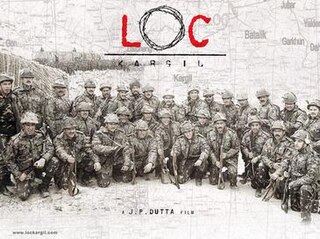
LOC Kargil is a 2003 Indian Hindi-language historical war film based on the Kargil War fought between India and Pakistan, produced and directed by J. P. Dutta under his banner "J. P. Films". The film features an ensemble cast of Bollywood stars and music composed by Aadesh Shrivastava and Anu Malik, with the former composing the score and the latter composing the songs.
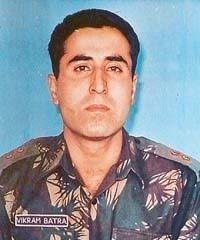
Captain Vikram Batra, PVC was an Indian Army officer. He was posthumously awarded the Param Vir Chakra, the highest Indian military decoration, for his actions during the Kargil War; on 7 July 1999, Batra was killed while fighting Pakistani troops around Area Ledge, Point 4875, in the Kargil district of erstwhile Jammu and Kashmir.
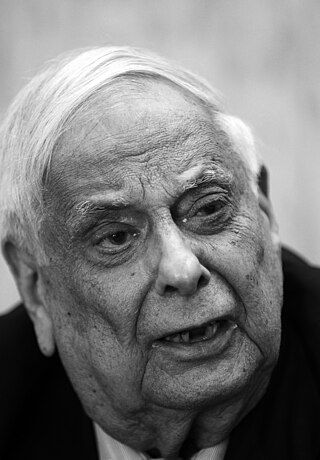
Lieutenant General Jack Farj RafaelJacob was a prominent Indian military officer. He was best known for his role in the Bangladesh Liberation War of 1971. Jacob, then a major general, served as the chief of staff of the Indian Army's Eastern Command. During his 36-year long career in the army, Jacob fought in World War II and the Indo-Pakistani War of 1965. He later served as the governor of the Indian states of Goa and Punjab.

Sobha Singh was an artist from Punjab, India.
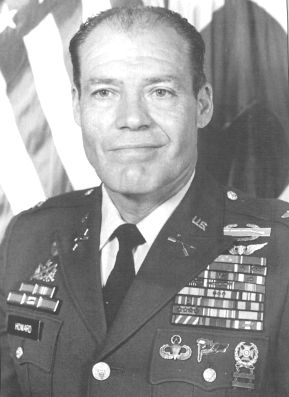
Robert Lewis Howard was a United States Army Special Forces officer and recipient of the Medal of Honor for his actions in the Vietnam War. He was wounded 14 times over 54 months of combat, was awarded the Medal of Honor, eight Purple Hearts, a Distinguished Service Cross, a Silver Star, and four Bronze Stars.
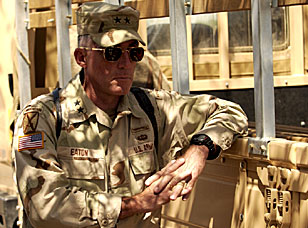
Paul D. Eaton is a former United States Army officer who commanded the operations to train Iraqi troops during Operation Iraqi Freedom. Eaton served in that capacity between 2003 and 2004, and then returned to the US to become Deputy Chief of Staff for Operations and Training, United States Army Training and Doctrine Command, Fort Monroe, Virginia. He previously served as Senior Adviser to the now-defunct National Security Network, a Washington, D.C.–based think tank focused on foreign policy and defense issues.
Al-Karmah, also sometimes transliterated as Karma, Karmah, or Garma, is a city in central Iraq, 16 km (10 mi) northeast of Fallujah in the province of Al Anbar.
Ghatak Platoons are special operations capable reconnaissance platoons consisting of Shock troopers these are present in every infantry battalion of the Indian Army. Ghatak is a Sanskrit word meaning "killer" or "lethal". Their name was given to them by General Bipin Chandra Joshi. They act as shock troops and spearhead assaults ahead of the battalion.
Lieutenant General Ranjit Singh Dyal, PVSM, MVC was an Indian Army general and an administrator. As a soldier, Ranjit Singh led the capture of the Haji Pir pass by the Indian army during the 1965 war with Pakistan. He also drew up the plans for Operation Blue Star, and served as the General-Officer-Commanding-in-Chief of the Southern Command. Later, he served as Lieutenant Governor of Puducherry and the Andaman and Nicobar Islands.

Ross Andrew McGinnis was a United States Army soldier who was posthumously awarded the United States' highest decoration for bravery, the Medal of Honor, for his actions during the Iraq War.

The 30th Armored Brigade Combat Team is a modular heavy brigade of the United States Army National Guard. 30th ABCT relieved 3rd ABCT/4ID in Kuwait, 1 November 2019. They returned to the U.S. in September 2020 and were replaced by the 2nd ABCT/1AD.

Lieutenant General Harbaksh Singh, VrC was an Indian senior military officer. As the commander of the Western Command, Singh commanded the Indian Army and played a key role during the Indo-Pakistani War of 1965. For his role in the war, he was awarded the Padma Vibhushan in 1966.

St. Stephen's School is a Roman Catholic school located in Chandigarh, India.
Lieutenant General Kuldip Singh Brar, PVSM, AVSM, VrC is a retired Indian Army officer, who was involved in the Indo-Pakistani War of 1971. As a major general, he commanded Operation Blue Star.

Wing Commander Kartar Singh Taunque, then Hawai Sepoy 1st Class, became the first personnel of Indian Air Force to win an award for Gallantry for a successful bombing raid during "Operations in Waziristan 1937–38". He was mentioned in dispatches. Flt. Lt. Peter Haynes and Hawai Sepoy 1st Class Kartar Singh Taunque, as the air gunner/bombardier, conducted a daring bombing raid in Waziristan during the World War II operations.

The Northern Command is a Command of the Indian Army. It was originally formed as the Northern Army of the British Indian Army in 1908. It was scrapped upon India's independence in 1947 and later re-raised in 1972. Currently, the XIV Corps (Leh), XV Corps (Srinagar), I Corps (Mathura) and XVI Corps (Nagrota) are under its control. Its present commander is Lieutenant General M. V. Suchindra Kumar.
Sikhs and Sikh Americans have served in the United States military since World War I through all subsequent wars. Since the 1980s, observant Sikhs have faced difficulty in serving due to a discontinuation of exemptions to uniform standards which previously allowed Sikhs to maintain their religiously mandated beards and turbans while in uniform.

Ramadi, the capital of Iraq's Al Anbar Governorate, was under U.S. military occupation during the Iraq War. It was a focal point of Iraqi insurgency, which erupted into open armed conflict in 2004 and in 2006, part of the Iraq War in Anbar Province. Operation Murfreesboro was a U.S. offensive in February 2007 intended to cut off the Ma'Laab district of eastern Ramadi from the rest of the town in order to drive out Zarqawi's Al-Qaeda in Iraq.

Lieutenant Navdeep Singh Bains, AC was a Ghatak Platoon Commander of 15 Maratha Light Infantry regiment in the Indian Army.

General Dalbir Singh Suhag, PVSM, UYSM, AVSM, VSM, ADC is the former Indian High Commissioner to Seychelles and a former Chief of Army Staff of the Indian Army. He was the 25th Chief of the Army Staff (COAS) of the Indian Army, serving from 31 July 2014 to 31 December 2016, and Vice Chief of the Army Staff prior to that.
















